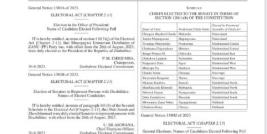On September 11, 2025, Republican Representative for Florida Brian Mast introduced HR 5300, Department of State Policy Provisions Act, into the House of Representatives, and it includes a provision to repeal the Zimbabwe Democracy and Economic Recovery Act and amendments, dating back to 2001.
Sanctions against individual Zimbabweans and companies under ZDERA were cancelled by a series of Joe Biden Executive Orders in 2024 but were immediately replaced by sanctions against 11 individuals and 3 companies under the Global Magnitsky Human Rights Accountability Act, administered by US Treasury.
On March 4, 2024, US President Joe Biden signed an Executive Order to terminate Executive Orders of Bush and Obama from 2003, 2005 and 2008 which had placed sanctions on a large number of individuals and companies by declaring that there was a state of emergency in Zimbabwe. But on the same day the US Treasury Department placed new sanctions under the Global Magnitsky Human Rights Accountability Act on the President of Zimbabwe, Emmerson Mnangagwa, his wife Auxilia, Vice President Constantino Chiwenga, Kudakwashe Tagwirei and his wife Sandra Mpunga, Sakunda Holdings and Fossil Agro, two Tagwirei companies, Obey Chimuka, a partner of Tagwirei, and Fossil Contracting, owned by Chimuka, Oppah Muchinguri, Defence Minister since 2018, Godwin Matanga, Commissioner General of the Zimbabwe Republic Police, Stephen Mutamba, Deputy Commissioner General of the ZRP, Walter Tapfumaneyi, Deputy Director-General of the Central Intelligence Organisation, and Owen Ncube, Minister of State Security from 2018 to 2022. In effect, out-dated sanctions were replaced with more active sanctions.
These Magnitsky sanctions still trigger US banking risk management assessments which are to restrict all US bank transactions with Zimbabwe.
The actual provision on Zimbabwe proposed in HR 5300 are short:
SEC. 303. REPEALING THE ZIMBABWE DEMOCRACY AND ECONOMIC RECOVERY ACT OF 2001
(a) IN GENERAL —The Zimbabwe Democracy and Economic Recovery Act of 2001 (ZEDERA Act), as amended, Public Law 107–99 (115 Statute 962) is hereby repealed.
(b) CONDITION ON FURTHER FUNDING FOR ZIMBABWE .— The United States shall not support any new or expanded funding from the International Monetary Fund or the International Bank for Reconstruction and Development (commonly known as the World Bank) for the Government of Zimbabwe unless the Government of Zimbabwe shall commit, within 12 months of the approval of such new or expanded funding, to remit all outstanding arrears owed under the Global Compensation Deed, inflation adjusted to the date of enactment, and compensation shall not be in the form of Zimbabwe issued securities.
Failure to comply with this provision shall result in an immediate cessation of all United States support for any further funding from these institutions.
Clause (a) would remove US blockage of any new IMF and World Bank loans to Zimbabwe. But Clause (b) puts a significant condition on that removal – the payment of about US$10 billion in compensation to mainly white commercial farmers for loss of improvements during Mugabe’s land seizure campaign in 2000 and later years.
As well, under their own rules, neither the World Bank nor the IMF would provide new loans to Zimbabwe until all arrears owing to them have been paid.
As at December 2024, Zimbabwe owed US$4.8 billion to the World Bank, African Development Bank, European Investment Bank and other multilateral creditors, and US$2.6 billion of this was arrears, accrued interest and penalties.
It is a straw in the wind – a favourable one – that HR 5300 would repeal ZDERA, and return US relations with Africa, including Zimbabwe, to something like normal commercial terms. But there is no guarantee that HR 5300 will ever be enacted, or enacted within the next few years.
However, HR 5300 does not address the impact of the Magnitsky sanctions on US banking policy, and this continues to be the main source of the economic sanctions against Zimbabwe as a whole and all its people, not only the 11 individuals and 3 companies listed at this point.
Conclusion
The possible repeal by the US Congress of ZDERA is welcome, but could be a long way off. This repeal would not remove the de facto US banking sanctions against Zimbabwe, which is the major real sanction imposed on Zimbabwe.
The possible repeal of ZDERA would not free up the World Bank and IMF to issue new loans to Zimbabwe unless Zimbabwe could pay all arrears, interest and penalties, and unless Zimbabwe could compensate all commercial farmers for losses to improvements in the farm seizure period.
The key objective of the anti-sanction campaign must remain to be the cancellation of the Zimbabwe listings under the US Global Magnitsky Human Rights Accountability Act. Steps along the way will be the cancellation of Australian, UK and Canadian “smart sanctions” on individuals and entities in Zimbabwe.
Peter Murphy
Zimbabwe Information Centre
September 24, 2025















